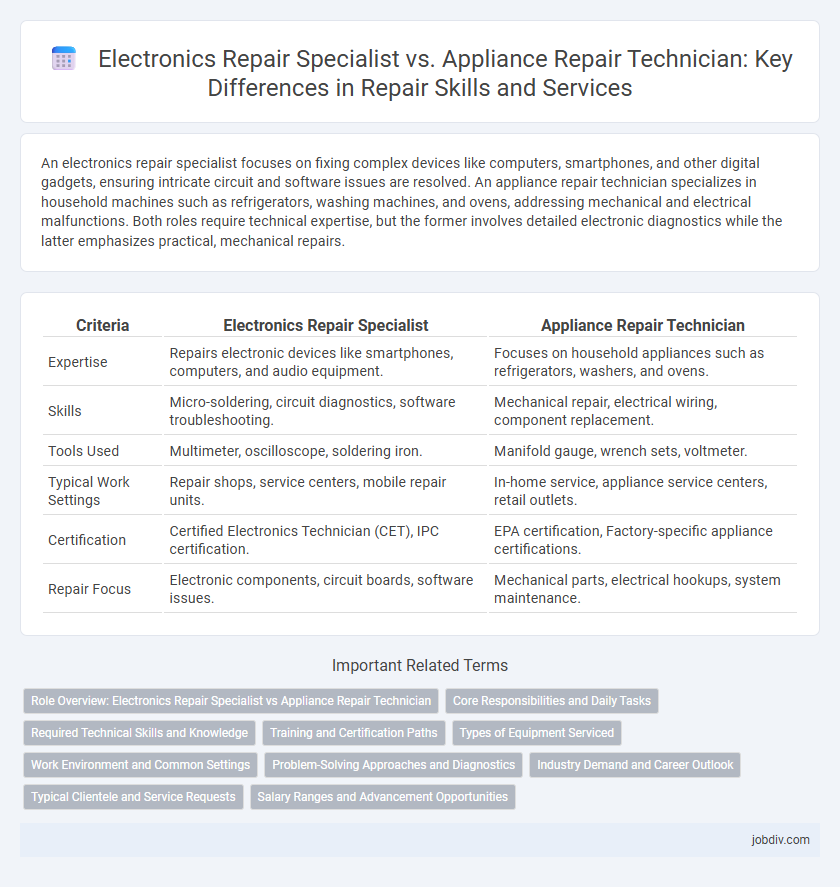An electronics repair specialist focuses on fixing complex devices like computers, smartphones, and other digital gadgets, ensuring intricate circuit and software issues are resolved. An appliance repair technician specializes in household machines such as refrigerators, washing machines, and ovens, addressing mechanical and electrical malfunctions. Both roles require technical expertise, but the former involves detailed electronic diagnostics while the latter emphasizes practical, mechanical repairs.
Table of Comparison
| Criteria | Electronics Repair Specialist | Appliance Repair Technician |
|---|---|---|
| Expertise | Repairs electronic devices like smartphones, computers, and audio equipment. | Focuses on household appliances such as refrigerators, washers, and ovens. |
| Skills | Micro-soldering, circuit diagnostics, software troubleshooting. | Mechanical repair, electrical wiring, component replacement. |
| Tools Used | Multimeter, oscilloscope, soldering iron. | Manifold gauge, wrench sets, voltmeter. |
| Typical Work Settings | Repair shops, service centers, mobile repair units. | In-home service, appliance service centers, retail outlets. |
| Certification | Certified Electronics Technician (CET), IPC certification. | EPA certification, Factory-specific appliance certifications. |
| Repair Focus | Electronic components, circuit boards, software issues. | Mechanical parts, electrical hookups, system maintenance. |
Role Overview: Electronics Repair Specialist vs Appliance Repair Technician
Electronics Repair Specialists focus on diagnosing and fixing circuit boards, semiconductors, and intricate electronic components in devices such as smartphones, computers, and audio equipment. Appliance Repair Technicians specialize in repairing household machines like refrigerators, washing machines, and ovens, dealing primarily with mechanical parts, electrical wiring, and control systems. Both roles require technical expertise, but Electronics Repair emphasizes precision in microelectronics, while Appliance Repair centers on larger systems integration and mechanical functionality.
Core Responsibilities and Daily Tasks
Electronics Repair Specialists primarily diagnose and fix issues with electronic devices such as smartphones, computers, and audio equipment, focusing on circuit board analysis, soldering, and software troubleshooting. Appliance Repair Technicians handle household appliances like refrigerators, washing machines, and ovens, specializing in mechanical repairs, system diagnostics, and parts replacement. Both roles require technical expertise but differ in the types of equipment serviced and the specific repair techniques employed daily.
Required Technical Skills and Knowledge
Electronics Repair Specialists require in-depth knowledge of circuit design, microprocessors, and soldering techniques to diagnose and fix complex electronic devices such as smartphones, computers, and TVs. Appliance Repair Technicians must master mechanical systems, electrical wiring, and diagnostics specific to household appliances like refrigerators, washing machines, and ovens. Both roles demand proficiency in troubleshooting and using specialized diagnostic tools, but Electronics Repair Specialists focus more on digital technology, while Appliance Repair Technicians emphasize electromechanical repair skills.
Training and Certification Paths
Electronics repair specialists typically require training in electronics technology, often through associate degrees or technical certifications such as IPC or CompTIA A+ for circuit and device troubleshooting. Appliance repair technicians generally pursue vocational training programs and certifications like the EPA 608 for refrigerant handling and NATE for HVAC systems to handle household appliances. Both paths emphasize hands-on experience but differ in specialization, with electronics focusing more on circuitry and microcomponents, while appliance repair involves mechanical and electrical systems integration.
Types of Equipment Serviced
Electronics Repair Specialists primarily service small electronic devices such as smartphones, laptops, and audio equipment, concentrating on circuit boards, microchips, and delicate internal components. Appliance Repair Technicians handle larger household or commercial appliances like refrigerators, washing machines, and ovens, focusing on mechanical parts, motors, and plumbing connections. Their expertise differs in the scale and complexity of equipment, with Electronics Specialists addressing intricate electronic circuitry and Appliance Technicians managing robust mechanical systems.
Work Environment and Common Settings
Electronics Repair Specialists typically work in clean, indoor environments such as repair shops or service centers, equipped with precision tools and diagnostic equipment for intricate circuit board and device-level repairs. Appliance Repair Technicians often operate in residential or commercial settings, performing on-site repairs of large household machines like refrigerators, washers, and ovens, requiring mobility and adaptation to varying workspace conditions. Both roles demand technical skills but differ significantly in workspace dynamics and equipment handling.
Problem-Solving Approaches and Diagnostics
Electronics repair specialists excel in diagnosing complex circuit board issues using advanced testing equipment and software diagnostics to identify faults in microchips, resistors, and capacitors. Appliance repair technicians focus on troubleshooting mechanical and electrical components within household devices, utilizing experience-driven assessments and multimeter readings to pinpoint problems in motors, thermostats, or wiring. Both professionals apply systematic problem-solving methods but differ in the depth of electronic complexity and diagnostic tools tailored to their specific repair domain.
Industry Demand and Career Outlook
Electronics Repair Specialists face growing industry demand driven by rapid advancements in consumer electronics, with a strong career outlook fueled by the need for skilled technicians in smartphones, computers, and audio-visual equipment. Appliance Repair Technicians benefit from consistent demand due to the essential nature of household appliances, supported by increasing investments in energy-efficient and smart home technologies. Both roles offer promising job stability, but Electronics Repair Specialists may experience faster growth rates due to continuous innovation and product lifecycles in the electronics sector.
Typical Clientele and Service Requests
Electronics Repair Specialists primarily serve clients with high-value items such as smartphones, laptops, and audio equipment, focusing on intricate circuit board issues and software diagnostics. Appliance Repair Technicians cater to homeowners and property managers, addressing common problems in large household machines like refrigerators, washing machines, and ovens, emphasizing mechanical and electrical component fixes. Both professionals handle distinct service requests tailored to their expertise, ensuring timely restoration of functionality and customer satisfaction.
Salary Ranges and Advancement Opportunities
Electronics Repair Specialists typically earn between $40,000 and $60,000 annually, with advancement opportunities often leading to senior technician or technical support roles in electronics manufacturing firms. Appliance Repair Technicians usually have a salary range of $35,000 to $55,000, with potential career growth into supervisory positions or specialized appliance diagnostics. Both fields offer stable demand, but Electronics Repair Specialists generally experience higher salary ceilings and more diverse advancement pathways due to the complexity of electronic devices.
Electronics Repair Specialist vs Appliance Repair Technician Infographic

 jobdiv.com
jobdiv.com